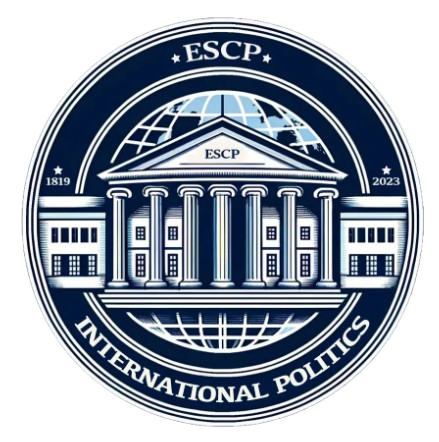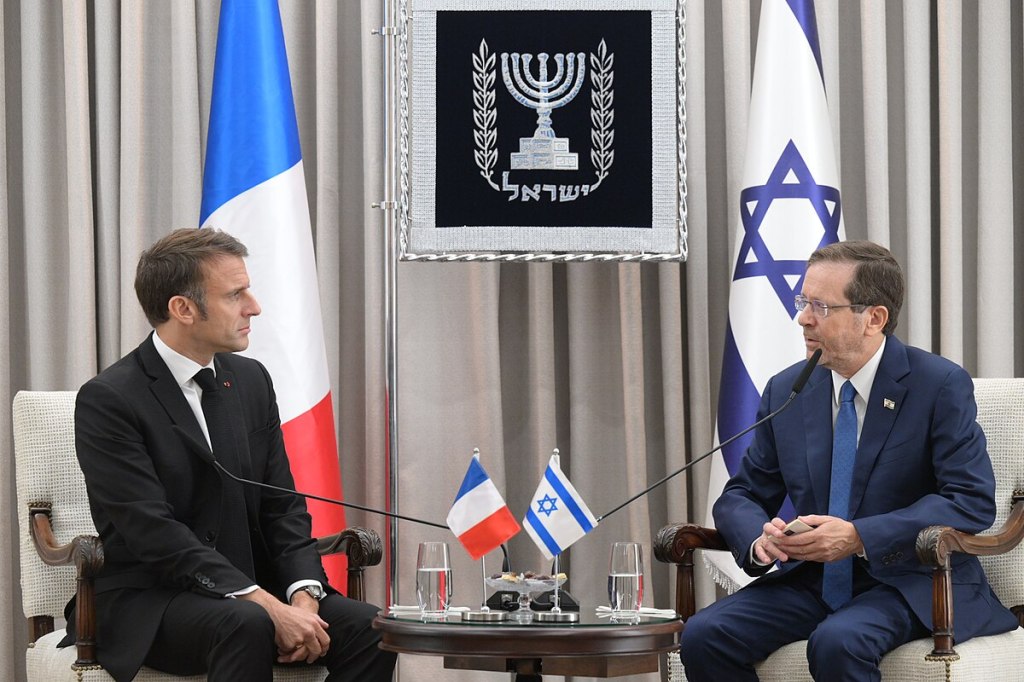By Pierre Gaillard.
On October 24th, Emmanuel Macron visited Tel Aviv to express his support for Israel following the tragic terrorist attacks the country experienced on October 7th. President Macron’s intent was clear from the outset of his visit: to strengthen support for a two-state solution [1], encourage de-escalation, and emphasise France’s independent stance in this conflict. The Elysée underscored this approach in an official statement: “The purpose of the visit is also to exchange views with the Israeli authorities to see what we can do […] to open a credible perspective of peace, which takes into account the needs of everyone in the region in terms of peace and security » [2]. Historically, France has positioned itself as a mediator [3] in this complex conflict, aiming to maintain strong relations with both Israel and Arab countries. This diplomatic “bridge” dates back to the era of Charles de Gaulle, but the rapid geopolitical changes of the 21st century undermined it.
However, President Macron’s visit, although commendable, has faced criticism for several reasons, highlighting a weakened position of the French president on both the Israeli and Palestinian sides. Firstly, some deem the visit too late, notably the French newspaper Le Monde [4]. Other leaders, such as Joe Biden (United States) and Olaf Scholz (Germany), had already taken positions by visiting right after the assault, positioning France as reactive rather than proactive.
Upon landing in Israel, a government official, not an Israeli leader, greeted the French president, showing the lack of interest in his visit.
Moreover, Emmanuel Macron’s capacity to influence events in the region seems limited in the eyes of many observers. Indeed, President Macron suggested reviving the 2014 coalition initially aimed at fighting ISIS [5] and invited several countries in the region to participate. The coalition against Daesh (ISIS), formed in 2014, involves 86 states, including European Union and NATO members, the United States, Saudi Arabia, Turkey, and Qatar. This coalition’s efforts led to significant victories, such as the liberation of Iraqi territories in December 2017 and territories in northeastern Syria from Daesh by March of the same year [6]. The coalition’s strategy encompasses military support, cutting off the terrorist group’s financial resources, and combating its propaganda, including on social media. President Emmanuel Macron’s proposal for a coalition against Hamas seeks to draw on this model. He suggests expanding the coalition’s focus beyond Daesh to include Hamas. The Elysée Palace clarified that this would involve building on the international coalition against Daesh and determining reusable aspects against Hamas [7]. The approach could include military operations, training Iraqi forces, sharing intelligence among partners, and combating terrorism financing. However, researcher Héloïse Fayet notes that the specifics of this project remain unclear [8].
At first glance, the idea of a regional and international coalition to counter Hamas seems pertinent.. However, the composition of this coalition raises questions: can countries like Qatar, known for their links with certain Islamist groups [9], really play a central role in this fight? Additionally, the president’s meeting with Mahmoud Abbas, President of the State of Palestine, who is increasingly seen as a diminished and losing influence leader, has also been cited as an example of the president’s inability to play a meaningful role in the conflict.
On the Palestinian side, France, once seen as a friend of the Arab world due to General de Gaulle’s post-Six-Day War statements criticising Israel [10] and the iconic scene between Jacques Chirac and an Israeli soldier in 1996 [11], seems to have a much more fragile image today. Indeed, the President’s stance is seen more as pro-Israeli, and decisions like the French government’s adoption of a general ban on pro-Palestinian demonstrations, later overturned by the courts [12], are cited as reasons why Mr. Macron has lost credit in the Arab world [13] .
In this context, Emmanuel Macron’s challenge takes shape: how to renew French influence in a region where France’s traditional “soft power” is fading?
Emmanuel Macron’s visit to Israel reveals the multiple challenges France faces in the Middle East. While the desire to mediate and advocate for lasting peace is evident, the path to achieving it is fraught with obstacles. France, with its rich diplomatic legacy, is at a crossroads: it must redefine its role, rebuild its credibility, and skilfully navigate an ever-evolving geopolitical landscape.
Edited by Justine Peries.
References
[1] “Emmanuel Macron: “Il nous faut agir de manière décisive aujourd’hui pour parvenir enfin à la solution de deux États, Israël et la Palestine.”” BFMTV, 25 October 2023, https://www.bfmtv.com/politique/emmanuel-macron-il-nous-faut-agir-de-maniere-decisive-aujourd-hui-pour-parvenir-enfin-a-la-solution-de-deux-etats-israel-et-la-palestine_VN-202310250577.html.
[2] “La diplomatie française au Proche-Orient mise à l’épreuve par la visite d’Emmanuel Macron en Israël.” EURACTIV.fr, 24 October 2023, https://www.euractiv.fr/section/international/news/la-diplomatie-francaise-au-proche-orient-mise-a-lepreuve-par-la-visite-demmanuel-macron-en-israel/.
[3] “Israël/Territoires palestiniens – Conférence pour la paix au Proche-Orient (15.01.17).” France Diplomatie, https://www.diplomatie.gouv.fr/fr/dossiers-pays/israel-territoires-palestiniens/processus-de-paix/initiative-pour-la-paix-au-proche-orient/article/israel-territoires-palestiniens-conference-pour-la-paix-au-proche-orient-15-01.
[4] Ricard, Philippe. “Emmanuel Macron en Israël, une visite tardive et le défi d’un rééquilibrage diplomatique.” Le Monde, 24 October 2023, https://www.lemonde.fr/international/article/2023/10/24/emmanuel-macron-en-israel-une-visite-tardive-et-le-defi-d-un-reequilibrage-diplomatique_6196161_3210.html.
[5] Benraad, Myriam. « L’État islamique : anatomie d’une machine infernale », Revue internationale et stratégique, vol. 96, no. 4, 2014, pp. 28-37.
[6], “Daech est-il vaincu ? – Ministère de l’Europe et des Affaires étrangères.” France Diplomatie, https://www.diplomatie.gouv.fr/fr/dossiers-pays/afrique-du-nord-moyen-orient/daech-est-il-vaincu/.
[7],[8] Fayet, Heloïse. “Entre Daech et le Hamas, « les différences sont majeures ».” IFRI, https://www.ifri.org/fr/espace-media/lifri-medias/entre-daech-hamas-differences-majeures. Accessed 10 November 2023.
[9] Roméo, Lou. “Guerre Hamas-Israël : « le Qatar a décidé de parler avec tout le monde ».” Le Point, 3 Novembre 2023, https://www.lepoint.fr/monde/guerre-hamas-israel-le-qatar-a-decide-de-parler-avec-tout-le-monde-03-11-2023-2541757_24.php. Accessed 10 November 2023.
[10] Cohen, Samy. « De Gaulle et Israël. Le sens d’une rupture », Élie Barnavi, éd., La Politique étrangère du général de Gaulle. Presses Universitaires de France, 1985, pp. 192-202.
[11] Boudisseau, Julien, et Pierre Bachelet. “La visite mouvementée de Jacques Chirac à Jérusalem en 1996 : «This is not a method, this is a provocation».” INA, 24 Octobre 2023, https://www.ina.fr/ina-eclaire-actu/chirac-israel-palestine-jerusalem-police-provocation-method.
[12] “Manifestations de soutien à la cause palestinienne : il revient aux préfets d’apprécier, au cas par cas, si le risque de troubles à l’ordre public justifie une interdiction.” Conseil d’État, 18 October 2023, https://www.conseil-etat.fr/actualites/manifestations-de-soutien-a-la-cause-palestinienne-il-revient-aux-prefets-d-apprecier-au-cas-par-cas-si-le-risque-de-troubles-a-l-ordre-public.
[13] “Emmanuel Macron sous le feu des critiques après sa visite en Israël.” impact.sn, 25 October 2023, https://www.impact.sn/Emmanuel-Macron-sous-le-feu-des-critiques-apres-sa-visite-en-Israel_a41244.html. Accessed 10 November 2023.
[Cover Image] Photo by Amos Ben Gershom, Title: “Isaac Herzog in Beit HaNassi”, Licenced under Creative Commons Attribution-Share Alike 3.0.



Leave a comment